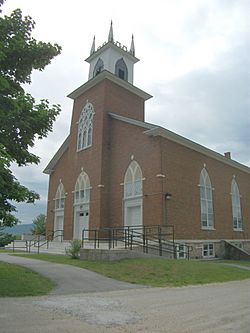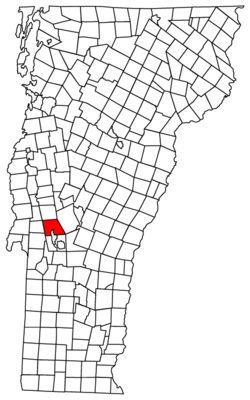Pittsford, Vermont facts for kids
Quick facts for kids
Pittsford, Vermont
|
|
|---|---|

Pittsford Congregational Church
|
|

Pittsford, Vermont
|
|
| Country | United States |
| State | Vermont |
| County | Rutland |
| Communities | |
| Area | |
| • Total | 43.6 sq mi (112.8 km2) |
| • Land | 43.5 sq mi (112.6 km2) |
| • Water | 0.1 sq mi (0.2 km2) |
| Elevation | 466 ft (142 m) |
| Population
(2020)
|
|
| • Total | 2,862 |
| • Density | 65.64/sq mi (25.372/km2) |
| Time zone | UTC-5 (Eastern (EST)) |
| • Summer (DST) | UTC-4 (EDT) |
| ZIP Codes | |
| Area code(s) | 802 |
| FIPS code | 50-55600 |
| GNIS feature ID | 1462174 |
Pittsford is a town located in Rutland County, Vermont, in the United States. It is known for its history, especially during the American Revolutionary War. As of the 2020 census, about 2,862 people live there.
The town was named after William Pitt. He was an important British leader. Pittsford also has two old forts. These forts were used during the Revolutionary War.
Contents
History of Pittsford
Pittsford was first settled in 1769. It was a frontier town back then. This means it was on the edge of settled areas. It is about 60 miles north of Bennington.
Revolutionary War Forts
Pittsford is home to two historical forts. These were made of picket fences. They were used by the local militia (citizen soldiers). The forts helped protect the area during the American Revolutionary War.
- Fort Mott was built in 1777.
- Fort Vengeance was built between 1780 and 1781. It is about a mile north of Fort Mott.
Naming of Pittsford
The town of Pittsford, New York, was also named after Pittsford, Vermont. Colonel Caleb Hopkins named the New York town. Both towns honor William Pitt.
Early Settlers
Some of the first people to settle in Pittsford were Benjamin Cooley III and Gideon Cooley. They were half-brothers. Both were members of the Green Mountain Boys. This was a group of soldiers from Vermont. Benjamin Cooley was even a Captain under Colonel Ethan Allen. He fought in the Capture of Fort Ticonderoga.
Geography of Pittsford
Pittsford covers a total area of about 43.6 square miles. Most of this area, about 43.5 square miles, is land. A small part, about 0.1 square miles, is water.
The main part of the town is the village of Pittsford. This village is located in the center of the town.
Population Changes Over Time
| Historical population | |||
|---|---|---|---|
| Census | Pop. | %± | |
| 1790 | 850 | — | |
| 1800 | 1,413 | 66.2% | |
| 1810 | 1,936 | 37.0% | |
| 1820 | 1,916 | −1.0% | |
| 1830 | 2,005 | 4.6% | |
| 1840 | 1,927 | −3.9% | |
| 1850 | 2,026 | 5.1% | |
| 1860 | 1,839 | −9.2% | |
| 1870 | 2,127 | 15.7% | |
| 1880 | 1,982 | −6.8% | |
| 1890 | 1,775 | −10.4% | |
| 1900 | 1,866 | 5.1% | |
| 1910 | 2,479 | 32.9% | |
| 1920 | 2,098 | −15.4% | |
| 1930 | 2,332 | 11.2% | |
| 1940 | 2,093 | −10.2% | |
| 1950 | 2,076 | −0.8% | |
| 1960 | 2,225 | 7.2% | |
| 1970 | 2,306 | 3.6% | |
| 1980 | 2,590 | 12.3% | |
| 1990 | 2,919 | 12.7% | |
| 2000 | 3,140 | 7.6% | |
| 2010 | 2,991 | −4.7% | |
| 2020 | 2,862 | −4.3% | |
| U.S. Decennial Census | |||
In 2000, there were 3,140 people living in Pittsford. By 2020, the population was 2,862. The average age of people in Pittsford in 2000 was 40 years old.
Notable People from Pittsford
Many interesting people have connections to Pittsford:
- George D. Chafee - A lawyer and lawmaker from Illinois.
- Thomas E. Drew - He was a former Adjutant General for the State of Vermont. He lived in Florence.
- Frederic Williams Hopkins - Another Adjutant General of Vermont from 1837 to 1852.
- Samuel Hopkins - He received the first American patent in 1790. This was for a process to make pearl and potash.
- Jake Lacy - An actor known for roles in TV shows like Better with You and The Office. He grew up in Pittsford.
- John Lowth - A lawyer and lawmaker from Wisconsin.
- Emma A. Winslow - A home economist, researcher, and writer.
Places to Visit in Pittsford
Pittsford has several interesting sites:
- Colburn Bridge
- Cooley Covered Bridge
- Depot Covered Bridge
- Fort Vengeance Monument Site
- Gorham Covered Bridge
- Hammond Covered Bridge
- Maclure Library
- Pittsford Green Historic District
- Thomas H. Palmer House
See also
 In Spanish: Pittsford (Vermont) para niños
In Spanish: Pittsford (Vermont) para niños
 | Emma Amos |
 | Edward Mitchell Bannister |
 | Larry D. Alexander |
 | Ernie Barnes |

